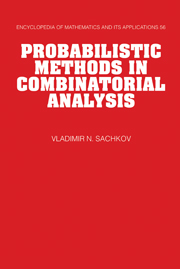Book contents
- Frontmatter
- Contents
- Preface
- Preface to the English translation
- Introduction
- 1 Relevant elements of probability theory
- 2 Combinatorial properties of random nonnegative matrices
- 3 Probabilistic problems in the general combinatorial scheme
- 4 Random partitions of sets
- 5 Random permutations
- 6 Random graphs and random mappings
- References
- Index
1 - Relevant elements of probability theory
Published online by Cambridge University Press: 18 March 2010
- Frontmatter
- Contents
- Preface
- Preface to the English translation
- Introduction
- 1 Relevant elements of probability theory
- 2 Combinatorial properties of random nonnegative matrices
- 3 Probabilistic problems in the general combinatorial scheme
- 4 Random partitions of sets
- 5 Random permutations
- 6 Random graphs and random mappings
- References
- Index
Summary
Introduction
The aim of the first two sections of this chapter is to provide a survey of the basic notions and results of probability theory which can be found in many textbooks. The concepts and theorems mentioned in Sections 1 and 2 are of an auxiliary nature and are included more for reference than for primary study. For this reason the majority of statements are given without proofs, the single exception being the theorem by Curtiss [21], which will be used frequently throughout the book.
Section 3 deals with typical examples of applications of various limit theorems to the analysis of asymptotic distributions in combinatorial problems. In terms of the properties of double generating functions we formulate rather general conditions providing asymptotic normality of certain classes of probability distributions which are met in combinatorial probability. Section 4 contains a comprehensive description of limiting distributions of random variables specified by double generating functions of the form exp{xg(t)}, where g(t) is a polynomial. In subsequent chapters, the method used to obtain the description will be extended to double generating functions of the form exp{g(x, t)}, where the function g(x, t) is not necessarily a polynomial in t.
Information
- Type
- Chapter
- Information
- Probabilistic Methods in Combinatorial Analysis , pp. 1 - 47Publisher: Cambridge University PressPrint publication year: 1997
